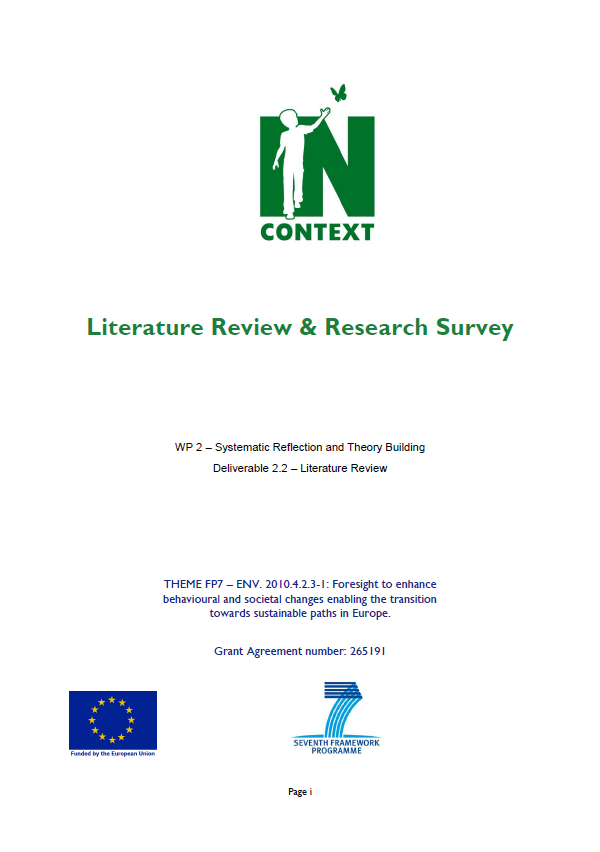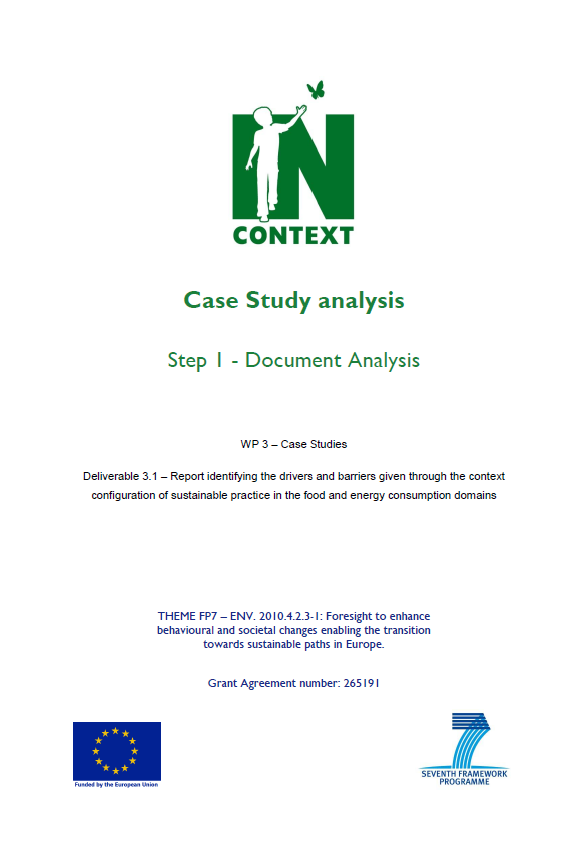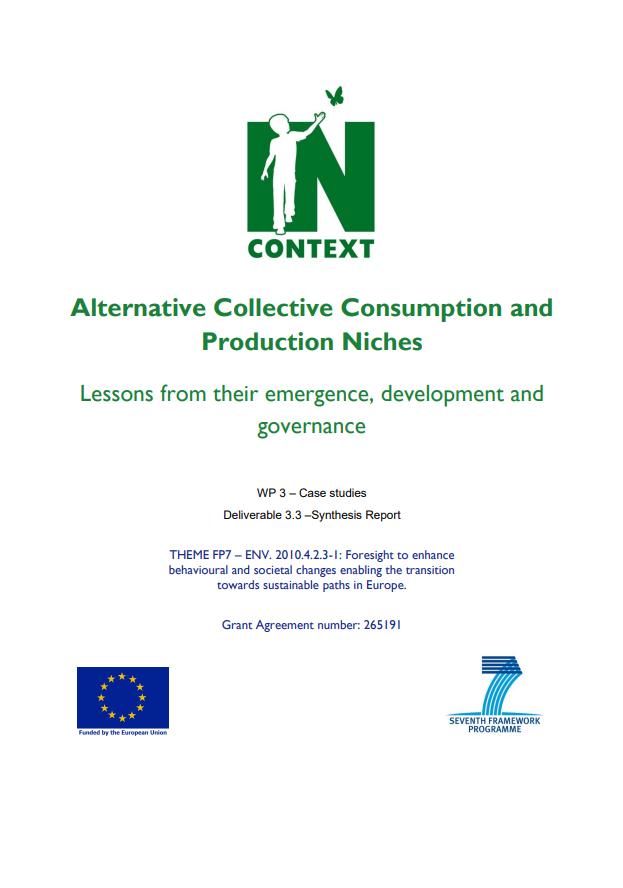Case Study Report – Beispiele für neue Modelle nachhaltigen Konsumierens und Produzierens
- Publikation
- Zitiervorschlag
Debourdeau, Ariane; Stefanie Baasch; Haran Bar-On and Katharina Umpfenbach 2012: Case study Report - D3.2: Empirical report, Berlin.
Dieser Bericht stellt die vier Fallstudien des InContext-Projekts vor: GELA – GEmeinsam Landwirtschaften, ein solidarisches Landwirtschaftsprojekt, Thursday Veggie Day, eine Initiative zur Verringerung des Fleischverzehrs sowie Municipal Energy Transition Process und Emission-Zero cooperative, zwei Projekte für Bürgerinvestitionen in erneuerbare Energien. Ziel dieses Berichtes ist es, ein besseres Verständnis alternativer Konsum- und Produktionsmuster zu erlangen, um diese künftig zu etablieren und ggf. zu verbreiten. Die Fallstudie [pdf, 2.9 MB, Englisch] steht zum Download bereit.
- Sprache
-
Englisch
- Autorenschaft
-
Katharina UmpfenbachHaran Bar-OnAriane Debourdeau (Université Libre de Bruxelles)Stefanie Baasch (UFZ)
- Finanzierung
-
Europäische Kommission, Generaldirektion Forschung & Innovation (GD Forschung & Innovation), International - Jahr
- Umfang
- 153 S.
- Projekt
- Projekt-ID
- Inhaltsverzeichnis
-
Gesamtes Inhaltsverzeichnis
A. Executive summary
B. Introduction
C. Methodology
Document analysis (see also D3.1)
Participative Network Analysis - PNA
Semi-structured Interviews and observations
Overview of the case specific methodological aspects
Gela 23
Wolfhagen 100% RES
Thursday Veggie Day (TVD) from Ghent to Brussels
Emissions-Zero cooperative
D. Case Studies
1 GELA - GEmeinsam LAndwirtschaften
1.1 Overview of the Case Study (fact sheet)
1.2 Overall aim: characteristics and purposes sought by the niche creation
1.2.1 Alternative practices
1.2.2 Niche characteristics
1.3 Emergence of a ‘configuration that works’
1.3.1 Grounds of the process: Gela’s collective contexts
1.3.2 The concretisation of the niche: Individual inner and outer contexts
1.3.3 Intermediate summary
1.4 On-going process: perpetuation, governance and institutionalisation of the niche
1.4.1 Evolution and transformation of the niche
1.4.2 Internal governance of the niche
1.4.3 ‘External’ governance of the niche
1.4.4 Intermediate conclusion: Drivers and barriers towards niche creation, perpetuation and institutionalisation
1.5 Patterns of diffusion
1.5.1 Configurational specificity and replicability
1.5.2 Enlargement
1.5.3 Insights on the diffusion of the niches: drivers and barriers
1.6 Conclusion
References
Annex A: Methodological specifications - Gela
Annex A.1: Document Analysis
Annex A.2: Participative Network Analysis
Annex A.3: Interviews
2 Wolfhagen: Municipal Energy Transition Process
2.1 Overview of the case study in Wolfhagen
2.2 Overall aim: characteristics and purposes sought by the niche creation in Wolfhagen
2.2.1 Wolfhagen’s energy transition process: an alternative practice?
2.2.2 Wolfhagen’s niche characteristics
2.3 Emergence of a ‘configuration that works’ in Wolfhagen
InContext – Deliverable 3.2: Case study report: empirical report
iii
2.3.1 Grounds of the energy transition process
2.3.2 Main aspects of the energy transition process
2.4 Ongoing process
2.4.1 Evolutions and transformations in the case of Wolfhagen
2.4.2 Governance of Wolfhagen’s energy transition process
2.4.3 Intermediate conclusion
2.4.4 Wolfhagen’s energy transition process: pioneering, repeatable or unique?
2.5 Conclusion
References
3 Thursday Veggie Day
3.1 General picture of the case study
3.2 Overall aim: characteristics and purposes sought by the niche creation
3.2.1 Alternative practices
3.2.2 Niche characteristics
3.3 Emergence of a ‘configuration that works’
3.3.1 Grounds of the process
3.3.2 The concretisation of the niche / Enactment of alternative collective practices
3.4 Ongoing process: perpetuation, governance and institutionalisation of the niche
3.4.1 Evolutions and transformations of the niche
3.4.2 Internal governance of the niche
3.4.3 ‘External’ governance of the niche
3.4.4 Intermediate conclusion: Drivers and barriers towards niche creation, perpetuation and institutionalisation
3.5 Patterns of diffusion
3.5.1 Configurational specificity and replicability
3.5.2 Current diffusion processes and strategies
3.5.3 Insights on the diffusion of the niches
3.6 Conclusion
Annexes
Annex A: EVA’s Stakeholders (detailed version)
Annex B: EVA's internal organogram from the Policy Programme 2011-2015
Annex C: The 5 Strategic Objectives (SO) – EVA Policy Programme 2011-2015
4 Emission-Zero cooperative
4.1 General picture of the case study
4.2 Overall aim: characteristics and purposes sought by the niche creation
4.2.1 Alternative practices
4.2.2 Niche characteristics
4.3 Emergence of a ‘configuration that works’
4.3.1 Grounds of the process
4.3.2 The concretisation of the niche / Enactment of alternative collective practices
4.4 Ongoing process: perpetuation, governance and institutionalisation of the niche
4.4.1 Evolutions and transformations of the niche
4.4.2 Internal governance of the niche
4.4.3 ‘External’ governance of the niche1
Intermediate conclusion: Drivers and barriers towards niche creation, endurance) and institutionalisation
InContext – Deliverable 3.2: Case study report: empirical report
4.5 Patterns of diffusion
4.5.1 Configurational specificity and replicability
4.5.2 Current diffusion processes and strategies
4.5.3 Insights on the diffusion of the niches
4.6 Conclusion
References
Annex A: Insight into a cooperative wind turbine’s financial plan
Annex B: REScoop’s Shared Energy Charter
5 General conclusion
References - Schlüsselwörter
-
Verbrauch, Konsum, Produktion
Das Individuum im Kontext: Unterstützende Umwelten für ein nachhaltiges Leben (InContext)
- Dauer
-
-
- Finanzierung
-
Europäische Kommission, Generaldirektion Forschung & Innovation (GD Forschung & Innovation), International
Konferenz:InContext Abschlusskonferenz & Informed Cities Forum 2013
- Datum
-
-
- Ort
- Berlin, Deutschland
Beáta Vargová (Design), Katharina Umpfenbach (Concept) 2013: Sustainable Lifestyle - InContext Poster Series. Poster. Berlin: Ecologic Institut.
Bauler, Tom et al. 2013: Alternative Collective Consumption and Production Niches - Lessons from their emergence, developement and governance, Berlin.
Piotrowski, Ralph; Susanne Langsdorf und Ania Rok 2013: Raus aus dem Rathaus – Dialog mit Nachhaltigkeitsinitiativen. [Policy Brief]. Berlin: Ecologic Institut.





